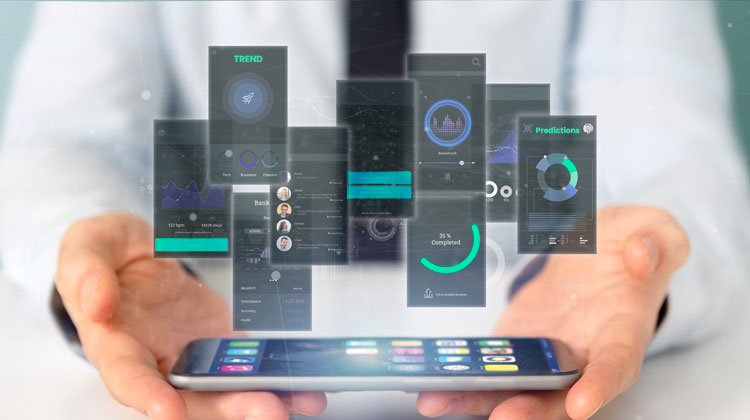The Future of Mobile App Development: Trends and Predictions

With advancements in mobile app technology and changes in user preferences, what worked a few months ago may not be as effective today.
Mobile app development is characterized by rapid change and constant evolution.
This article looks at the future of mobile app development, using the lens of current mobile app trends to make a few predictions.
Top Mobile App Development Trends
Artificial intelligence (AI) has captured the world’s attention, but it’s only one of the mobile development trends changing the landscape. Let’s take a look at the impact of AI and other mobile app development trends.
AI and Machine Learning
AI and Machine Learning (ML) are transforming mobile app development by enabling smarter, more personalized user experiences.
These technologies allow mobile apps to analyze and learn from user behavior, then make intelligent predictions or recommendations based on that data.
Developers leverage AI to create intelligent chatbots for customer service, use ML for predictive text in messaging apps, or design personalized content recommendations in media streaming apps.
As AI and ML become more sophisticated, they offer vast potential for enhancing app functionality, improving user engagement, and driving customer satisfaction. Like it or not, AI is going to heavily influence the future of mobile technology.
Augmented Reality (AR) and Virtual Reality (VR)
Augmented Reality (AR) and Virtual Reality (VR) technologies are rapidly evolving, introducing new dimensions to mobile app experiences.
AR apps overlay digital information or graphics onto the real world, enhancing user interaction with their physical environment. These applications range from interactive games to apps that help with interior design or navigation.
On the other hand, VR apps create immersive, simulated environments, often used in gaming or virtual tours.
Apple’s Vision Pro and Meta’s Ray-Ban smart glasses are two strong indicators the future of mobile apps will involve AR/VR.
As smartphone hardware improves and AR/VR technologies become more accessible, we expect to see a surge in innovative applications that blend the boundaries between our digital and physical worlds, creating engaging and immersive experiences.
IoT-Enabled Mobile Applications
The Internet of Things (IoT) is one of the most enduring mobile app trends, and it shows no signs of waning.
IoT-enabled mobile applications serve as an interface for users to control and monitor these IoT devices. For instance, smart home apps allow users to regulate their home’s temperature, lighting, and security systems remotely. Health and fitness apps can sync with wearable devices to track health metrics. Industrial IoT apps enable remote monitoring and management of manufacturing processes.
As the number of IoT devices grows, mobile applications will play a critical role in harnessing this technology, driving convenience, efficiency, and innovation across various sectors.
Mobile Commerce
Mobile commerce apps have revolutionized how we shop, bringing the marketplace to the palms of our hands. These apps, ranging from large online retailers like Amazon to individual brand stores, offer users the ability to browse, compare, and purchase products anytime, anywhere, with just a few taps.
They often include features like personalized recommendations, secure payment gateways, order tracking, and customer reviews, enhancing the shopping experience.
Additionally, the rise of social commerce, with platforms like Instagram and Facebook integrating shopping features, blurs the lines between social media and e-commerce. With consumers now shopping with mobile devices, m-commerce apps will continue to be one of the most enduring mobile app development trends.
Wearable Apps
We can’t talk about the future of mobile apps without mentioning apps designed for smartwatches, fitness bands, and wearable health monitors.
These apps are revolutionizing sectors like fitness, healthcare, and entertainment. Fitness apps can track steps, monitor heart rate, and provide workout plans. Medical wearable apps can monitor crucial health parameters, alert users about potential health risks, and even share data with doctors for remote monitoring. Entertainment-focused wearables, such as those for VR and AR glasses, provide immersive experiences.
As wearable technology advances and becomes more integrated into daily life, wearable apps will continue to be one of the big mobile development trends.
Cloud-Driven Mobile Apps
Cloud-driven mobile apps store data on cloud servers instead of the device itself. This approach offers numerous benefits:
- It allows users to access data from anywhere across multiple devices, ensuring data consistency.
- It allows for easier scaling, as server resources can be increased or decreased as needed.
- It enhances app performance by offloading heavy computing tasks to powerful cloud servers.
- It facilitates collaboration for apps requiring multiple users to work on shared data.
With advancements in cloud technology and the growing need for seamless, scalable, and collaborative experiences, cloud-driven mobile apps are set to dominate the future of mobile technology.
Blockchain in Mobile Apps
Blockchain technology, known for underpinning cryptocurrencies like Bitcoin, has significant implications for mobile app development.
By leveraging its decentralized and secure nature, developers can create mobile apps with enhanced transparency, security, and efficiency. For instance, financial apps can use blockchain for secure, tamper-proof transactions. Supply chain apps can leverage it for traceability, ensuring product authenticity. Social media apps can utilize blockchain to give users control over their data, reducing privacy concerns. Furthermore, blockchain can enable peer-to-peer transactions, reducing the need for intermediaries and lowering costs.
As the understanding of blockchain evolves beyond cryptocurrencies, its integration into mobile apps is poised to become one of the major mobile app development trends of the next few years.
5G Technology
It may seem odd to find 5G on a list of mobile app trends, but it has revolutionized mobile app development with its exceptional speed, low latency, and high capacity.
These advancements open up a new world of possibilities for app developers. For instance, apps that rely on real-time data, such as autonomous vehicles, remote surgery, or live gaming, can benefit from 5G’s minimal latency. Its high data transmission speed and capacity can enhance the performance of data-heavy apps, like those used for streaming 4K videos or AR/VR. Additionally, 5G’s ability to connect a vast number of devices simultaneously has boosted IoT app development.
As 5G networks become more widespread, they will significantly influence the future of mobile applications.
Edge Computing
Edge computing refers to the decentralization of data processing, moving it closer to the source of data or the “edge” of the network. In the context of mobile development trends, edge computing can significantly enhance performance and functionality.
Apps that require real-time processing and low latency, like autonomous vehicle controls or AR/VR applications, can benefit significantly from edge computing. By processing data locally on the device or nearby edge servers, these apps can respond faster and function reliably, even with intermittent connectivity.
In addition, edge computing can enhance privacy and security by keeping sensitive data on the device. As the demand for real-time, high-performing apps grows, edge computing will play an increasingly vital role.
Voice User Interface
Voice User Interface (VUI) refers to human-computer interaction where voice commands are used to operate devices. In mobile apps, VUI can provide a convenient, hands-free alternative to touch-based interactions, improving accessibility and user experience. This technology is already prevalent in personal assistant apps like Siri, Alexa, and Google Assistant. It’s also being integrated into other apps, enabling tasks like voice-based searches, dictation, and voice-controlled navigation.
Furthermore, VUI is integral in developing apps for wearable devices, where screen sizes can limit traditional interaction methods. As natural language processing and voice recognition technologies continue to improve, VUI will play a more prominent role in shaping future mobile app experiences.
Quantum Computing
Quantum computing, a cutting-edge technology based on the principles of quantum physics, offers computing capabilities far exceeding current systems.
While its application might be in the distant future of mobile apps, some recent developments suggest its potential impact. For instance, quantum encryption could significantly enhance app security by making data virtually unhackable.
Quantum algorithms could also improve AI in mobile apps, leading to more efficient machine-learning processes and better personalization.
Quantum computing’s potential for simultaneous processing could expedite complex computations, enhancing performance for data-intensive apps.
However, significant challenges remain, including stability of quantum states and scalability. As quantum computing evolves, it may bring about transformative changes in mobile app development.
Preparing for the Future
Analyzing these trends can help you prepare for the future of mobile technology, but you also need to know what drives your users and how their behavior will impact your app.
Understand Your Users: Regardless of trends, understanding your users and their needs should be the primary focus. Trends should be leveraged to enhance user experience, not just for the sake of using new technology.
Plan for Scalability: As your app grows, it will need to handle more data, users, and possibly more features. Design and develop your app with scalability in mind from the beginning.
Prioritize Security: No matter the trend, don’t compromise on security. Ensure your app complies with the latest security standards and best practices.
Collaborate and Iterate: The development process should be iterative. Collect feedback, measure performance, learn, and improve. Collaborate with users, other developers, and stakeholders to continuously refine your app.
Stay Agile: In a rapidly evolving field, flexibility is vital. Be ready to pivot your strategy and adapt your app based on new trends, user feedback, and performance data.
Adapt and Thrive
The future of mobile app development looks promising, with numerous exciting trends on the horizon. These opportunities will also bring challenges, particularly in security, privacy, and cross-platform development.
The pace of change in this field is rapid. Those who can adapt, learn, and innovate will be the ones who thrive.
So, whether you’re a developer looking to enhance your skills or a business seeking to create a successful mobile app, be ready to explore new technologies, engage with emerging trends, and continuously strive to create better, more valuable applications for your users.

